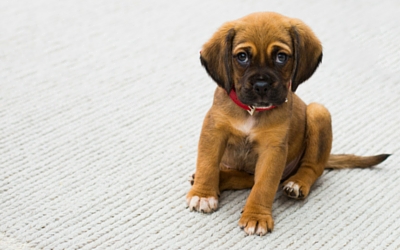
March 23rd is National Puppy Day!
Spring is the time many people adopt new puppies, so the week leading up to National Puppy Day is a great time to discuss some important points around bringing home a new little ball of fur. Getting a new puppy can be thrilling, but be sure to curb your excitement long enough to make sure the home you are bringing her into is safe and secure. Puppy- proofing your home is very similar to child proofing- put anything away or out of reach that you don’t want destroyed, and make sure anything dangerous is well-secured.
Up, Up and Away!
The first rule of puppy- proofing: remove anything at puppy-level that you don’t want rummaged through, chewed up or eaten. Anything left out at eye level is fair game as far as your new furry family member is concerned. That includes your favorite shoes by the door, the kid’s toys, and anything else that might tempt your new pup as she explores her new domain. Place things high up in cabinets and closets, away from curious noses.
Fasten it down!
There will always be those objects that you can’t put away in a closet or cabinet, so make sure to secure any furniture and décor items that your pup could jump up on or knock over. This includes furniture pieces like bookcases, standing lamps, and large decor items that could get knocked over and fall on you pup. Secure or conceal any electrical cords, as they can be tempting to chew, but can lead to electrical shock.
Close it up!
Open storage is not really puppy-friendly, unless it’s something you don’t mind getting snooped around in, and are positive cannot hurt your new furry friend. Small toys and kid’s craft supplies can be particular threats, so make sure those items are put securely away, or in an area your new pet won’t have access to. Swap out regular garbage cans for ones with pet proof lids, and them in a cabinet or pantry if possible. Also be sure to put cleaning supplies, chemicals, medications, and the like away in cupboards that close securely.
Out and about…
Before bringing your puppy home, take a walk around the outside of your home, looking for anything that could be dangerous for your puppy. Look for any weak spots in fencing that your pup may be able to escape from, and if you have a pool, check that the safety fence around it is in good shape too. If there is no fence, make a mental note to not let your pup out unattended around the pool, as pools are a safety hazard for puppies. Also, be aware of what local wildlife is like in your area- if there are known predators such as coyotes or hawks around, make sure to keep a close eye on your pup when outside, especially while they are young and small. In the garage or any outbuildings, place things like antifreeze, pesticides, pool chemicals and gasoline high up in closed storage, out of reach.
Taking the time to make sure your home is a safe and secure place for your new puppy is very important for their health and well-being, and sets the stage for a long and happy puppy-person cohabitation.
